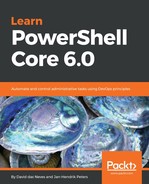As you know, PowerShell Core 6 and all following PowerShell versions depend on .NET Core. The first version of .NET Core was released in 2016:

On August 14, 2017, .NET Core 2 was released, on which PowerShell Core 6.0 is based. It implements .NET Standard 2.0 with the following conditions (https://github.com/dotnet/standard):
- .NET Standard defines a set of APIs that have to be implemented by all .NET platforms, as shown in the following diagram
- .NET Standard 2.0 is implemented by .NET Core
- .NET Standard 2.0 includes a compatibility shim for .NET Framework binaries
- .NET Standard will replace Portable Class Libraries (PCLs)
You can see the .NET Standard API definition in the .NET/standard repository on GitHub.
In the following diagram, you can see this implementation for all .NET platforms:

Though there were no substantial changes made to the language itself in the .NET Standard 2.0 Release, the increase in API size—and hence, the tools available—more than justified the increased footprint:
|
Version |
Number of APIs |
Growth % |
|
1.0 |
7,949 |
|
|
1.1 |
10,239 |
+29% |
|
1.6 |
13,501 |
+32% |
|
2.0 |
32,638 |
+142% |
.NET Standard 2.0 includes the most important APIs and brings almost all .NET Framework 4.6.1 APIs to .NET Core 2.0:

PowerShell Core will be supported by Microsoft's Modern Lifecycle Policy.
The Modern Lifecycle Policy covers products and services that are serviced and supported continuously. Under this policy, the product or service remains in support if the following criteria are met:
- Customers must stay current as per the servicing and system requirements published for the product or service
- Customers must be licensed to use the product or service
- Microsoft must currently offer support for the product or service
